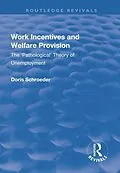This title was first published in 2000: Over the past decade the welfare state has come under sustained attack not only from quarters which never approved of its policies, but also from political theorists who used to support it. With the collapse of communism, the policy of comprehensive welfare provision came under renewed scrutiny. It was argued that its impact on work incentives is most detrimental. Examining in detail current unemployment debates within Western welfare states, this book seeks to verify or refute the view that non-work is increasingly chosen by work shy individuals - the 'pathological' theory of unemployment. Drawing from a range of disciplinary perspectives - from social philosophy and the history of philosophy, to occupational psychology and feminist economics - this interdisciplinary analysis reveals that the "pathological" theory of unemployment, with its reliance on a deficient depiction of human nature and its disregard of non-pecuniary work incentives and empirical evidence on benefit fraud, cannot be upheld. Schroeder presents an alternative explanation for the phenomenon of widespread Western unemployment through new insights into an 'external barrier' theory of unemployment, namely technological displacement combined with a refusal to return to a two-tiered Victorian society. By effectively combining empirical data with philosophical deliberations, the book provides an important contribution to the welfare state debate.
Autorentext
Doris Schroeder
Klappentext
This title was first published in 2000: Over the past decade the welfare state has come under sustained attack not only from quarters which never approved of its policies, but also from political theorists who used to support it. With the collapse of communism, the policy of comprehensive welfare provision came under renewed scrutiny. It was argued that its impact on work incentives is most detrimental. Examining in detail current unemployment debates within Western welfare states, this book seeks to verify or refute the view that non-work is increasingly chosen by work shy individuals - the 'pathological' theory of unemployment. Drawing from a range of disciplinary perspectives - from social philosophy and the history of philosophy, to occupational psychology and feminist economics - this interdisciplinary analysis reveals that the "pathological" theory of unemployment, with its reliance on a deficient depiction of human nature and its disregard of non-pecuniary work incentives and empirical evidence on benefit fraud, cannot be upheld. Schroeder presents an alternative explanation for the phenomenon of widespread Western unemployment through new insights into an 'external barrier' theory of unemployment, namely technological displacement combined with a refusal to return to a two-tiered Victorian society. By effectively combining empirical data with philosophical deliberations, the book provides an important contribution to the welfare state debate.
Inhalt
Contents: Introduction; The 'pathological ' theory of unemployment; The history of work; Action, intention and work incentives; Homo economicus; Benefit fraud, tax evasion and the 'lazy scrounger'; 'External barrier' theories of unemployment; Potential solutions for unemployment; Résumé; Bibliography; Index.
